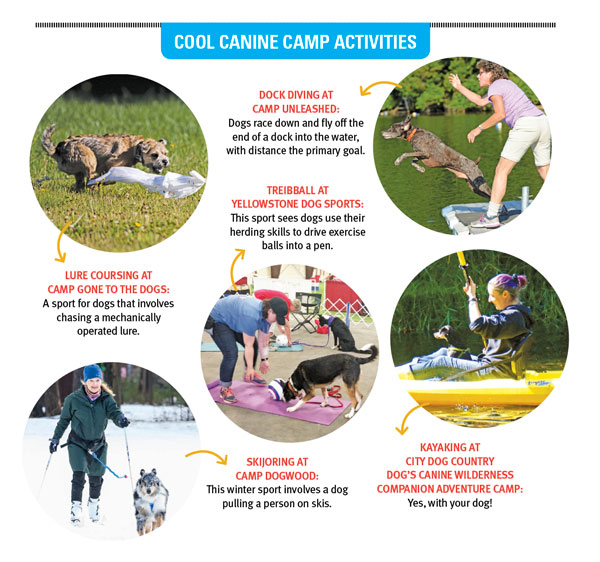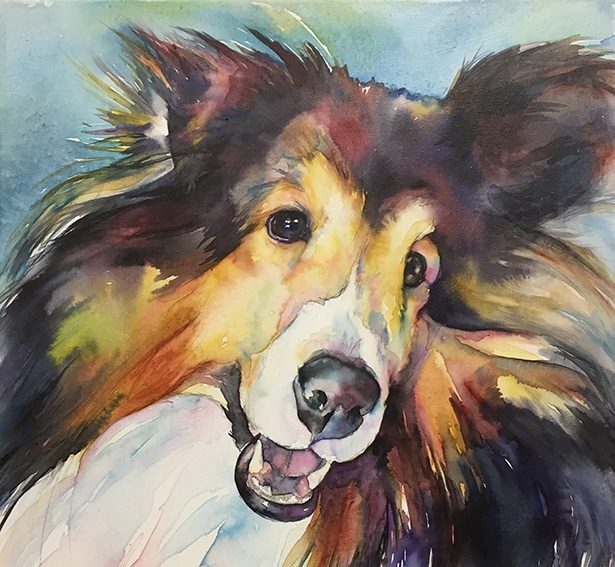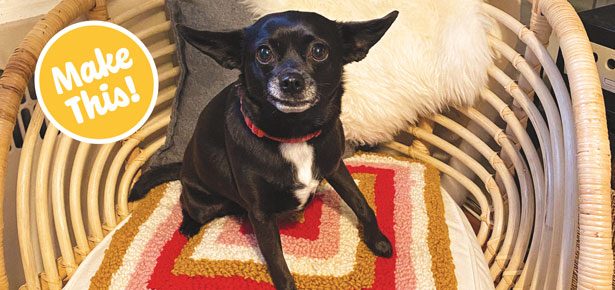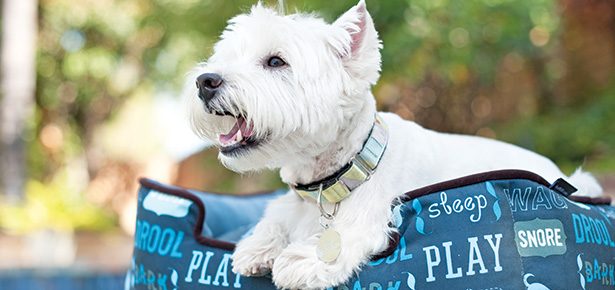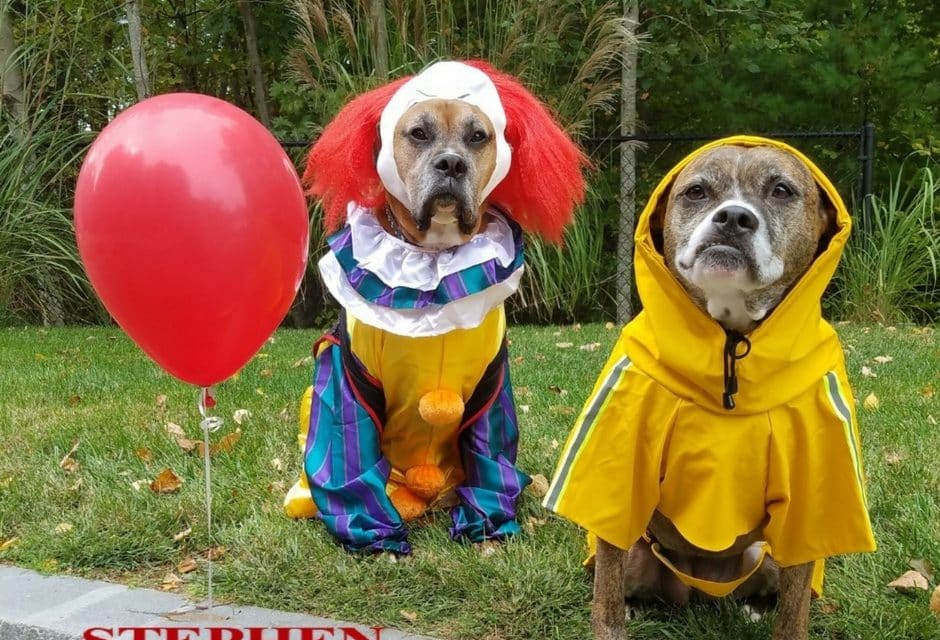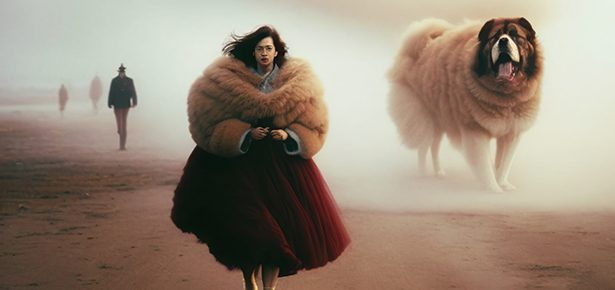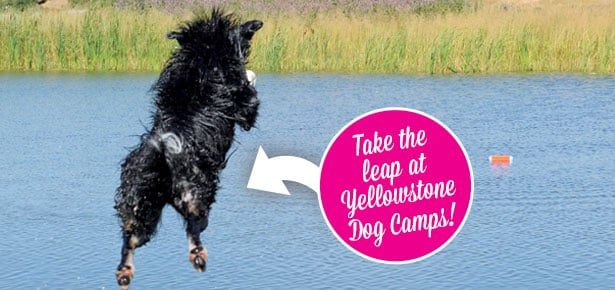
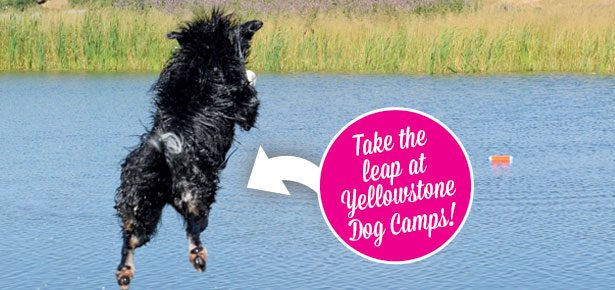
Camp Canine
Camp goes to the dogs! Beyond the opportunity to vacation together, canine camps offer a multitude of benefits for dogs and their people, from new friends and skills to a deeper connection.
Alysa Slay loved going to “sleep-away camp” as a kid. She even worked as a staff member at an overnight camp once her days as a regular camper were over.
“I am just a big camp person,” she chuckles. “There’s something about the environment that’s so special, where you can try things you don’t normally get to do at home. There’s also the aspect of making friends and memories that last a lifetime—what’s not to love?”

“Our goal was to take all the things that make sleep-away camp special for kids and create a similar experience for adults and their pets,” she says. “It’s really important to us to offer the chance to try new activities—things our campers, people and dogs, may not have access to in the often-urban areas where they live, or aren’t even aware existed.”
Hence Dogwood’s full roster of spring, fall, and even winter camp activities, including lure coursing, skijoring, treibball (a sport in which dogs must gather and drive large exercise balls into a soccer goal), and “doga” (dog-friendly hatha yoga). To create a true camp experience, campfires, sing-alongs and s’mores are added to the mix.
“We’ve had people come to camp and see their dogs swim in a lake or pull a sled for the first time and, not only do their pets love it, it actually opens the owners’ eyes to who their dog really is and what he or she likes to do and is naturally good at.”
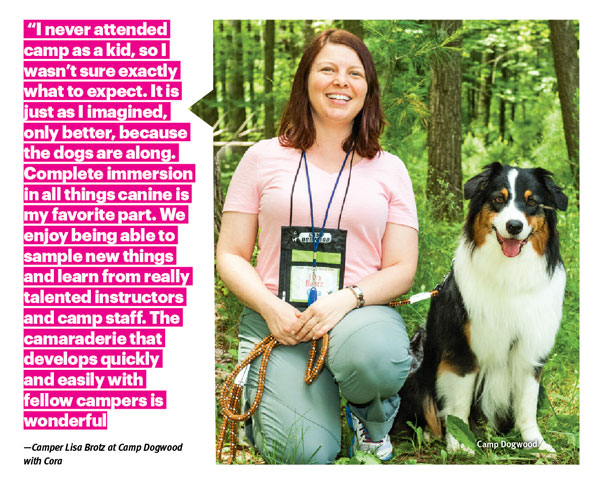
One thousand or so miles east, in Vermont, is Camp Gone to the Dogs. Founded in 1989, it is likely the longest-running dog camp in the United States. It holds a similar philosophy.

In fact, Gone to the Dogs offers at-camp prep and testing for Canine Good Citizen and Therapy Dogs International certification. As for sportier pursuits, classes range from obedience and agility to disc, jump chuting, parkour, dock diving, and freestyle dancing. There are also dog-friendly arts and crafts (think leash-making and paw-print creations) and guest speakers—canine experts like Christine Zink and Tim Lewis—who discuss such topics as preventing and solving behaviour problems and raising a leader dog.
“The speakers and topics change and the activities evolve—we add new and exciting things for campers to try each year,” says Mare, explaining that many of her campers are repeat customers. “The main thing is building that bond with your dog. We really see that development with people who bring a young puppy or a new rescue dog to camp and, over the years and through the various activities, develop a true partnership.”
Strong relationships, she adds, are also formed between the people who come to camp.
“We call it a family reunion each year, with so many people coming back and bonding over a love of dogs,” she says with a smile. “Campers who have known each other for years have become such great friends—they even vacation together outside of camp!”
The same is true at Yellowstone Dog Camps, run by Elaine Osmun in Red Lodge, Montana, where campers from all over the U.S. and Canada attend four five-day sessions throughout the summer.
“They’re a pretty diverse group,” says Elaine, adding that the dogs, too, differ in age, size, breed, temperament, ability, and camp experience. As at all the canine camps though, there are certain safety parameters around the dogs that can attend.
“We have dogs that are fearful or with some tough animal behaviours, and we can deal with that as long as the dog isn’t reactive and dangerous to other dogs or to people and isn’t going to be too overwhelmed by lots of activities and other dogs coming and going,” she says. “We’ve had, for example, very shy dogs come and become more confident at camp, because we are very mindful to keep it a safe and inclusive environment.”
Beyond the 90 acres of space, swimming ponds, and hiking trails, Yellowstone features a large indoor arena where all levels of agility training and other activities are conducted. Accommodations at the camp are on-site, featuring comfortable, dog-friendly rooms that are either single or shared. Meals—for the people—are served family style, while pooches remain in their rooms to eat and take a well-deserved rest. At Gone to the Dogs, summer camp accommodations are dorm-style, on a beautiful 250-acre college campus, while their fall session offers campers rooms at a dog-friendly inn. In Dogwood’s case, bunking options range from lodge rooms to cabins to tenting and RV sites, as well as a nearby dog-friendly hotel.
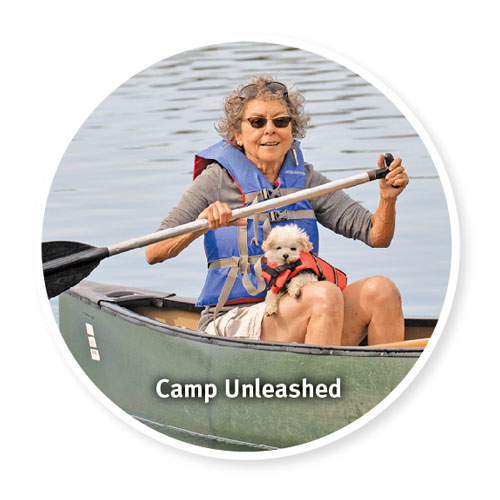
“I named it Camp Unleashed so I’d stick to that mandate and wouldn’t chicken out!” she laughs. “My goal was, and still is, to invite people to come to camp, let their dog loose in nature, and thus get to see the world through his or her eyes. In that way, the objective has evolved over the years from simply a desire to let a dog be a dog, which means being in nature, not always tethered to its owner and feeling something other than a concrete sidewalk under its paws, to more of a mutual understanding between owner and pet.”
Camp activities, Annie explains, are team-based, encouraging a true partnership to form between man or woman and dog. From scent games to canoeing to recall work, all require communication between the two species. Unleashed also offers a variety of workshops designed to further strengthen the bond, including lessons on how to teach your dog new tricks, canine cognitive games, and even “doglish as a second language,” which teaches owners to recognize, read, interpret, and respond to their pets’ nuances.
“I think that our dogs deserve the utmost respect from us, and for us not to sway into the territory of, ‘Oh, I think I know what he wants, he’s upset because another dog barked or he hears sirens outside or whatever,’ as opposed to really understanding how dogs think,” she says. “I’m always looking for the newest study, report, and insight that can help us develop camp programs and assist campers in bridging that species gap. It’s my small way of giving back, both to dogs and to the people who love them.”
To that end, Camp Unleashed partnered with the Tails of Hope Foundation to offer a very special camp for military veterans with PTSD and their service dogs last year. It was a small pilot, with just seven campers, but according to Annie “there was great value in it.”
“One gal came with her two service dogs and blossomed from the experience—she told us it was the first time in years she felt ‘almost normal’ again,” Annie recalls. “We could see more than ever how the benefits of camp extend to both the humans and the dogs.”
Caroline Spark, owner of City Dog Country Dog in Portland, Oregon, couldn’t agree more. Her numerous retreats, set in the picturesque Yachats River Valley, include a reactive dog camp (a chance for dogs who are canine reactive to participate in specially designed activities and classes that help them practice being calm and focused around other dogs), a canine wilderness companion adventure camp (culminating in a basic canine wilderness companion certificate for your dog) and a camp for service dogs.
“Service dogs are awesome. They work hard, some 24-7, and deserve a vacation from time to time,” Caroline says, adding that the camp, a non-profit project called A Dog’s Dream, gives working pups the opportunity to swim in a river, play in an open meadow and sniff an animal trail to their heart’s content—i.e., it brings vacation opportunities to service dogs who otherwise may not have the means or opportunity to enjoy them.
“Increasingly, service dog owners or partners are aware that their dogs need time off. Like anyone, they work better when they have time to relax and just be a dog,” she explains. “I worked with psychiatric service dogs for a time and what I saw was the human partners wanted to help their dogs relax but needed coaching in how to do that.”
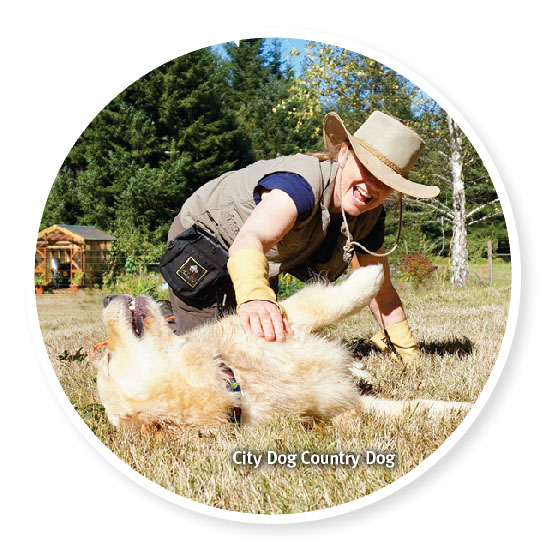
“Partnering with a service dog brings benefits and also challenges, like managing public access, dealing with other people’s reactions, taking care of your dog’s health-care needs, tackling ongoing training issues and facing the eventual retirement and loss of your beloved partner,” she explains. “This retreat gives people with various disabilities the opportunity to come together and not only take part in facilitated group discussions, but share their stories and gain support from others with similar experiences. It was very powerful, and it made me—us—realize the need for this type of camp program is great.”
Back at Camp Unleashed, Annie, too, welcomes people with disabilities to come to camp with their service dogs—she’s even had disabled dogs, some in wheelchairs, attend a retreat and have “a great time.” And that, she says, is part of the beauty of camp: the way it can bring campers from “all walks of life” together for a good time.
“It’s amazing the variety of ‘dog people’ we get at camp,” she says. “They come from all over, they work in all professions, they range widely in age … but the thing they have in common is that they truly love their dogs. Their dog is a member of their family and, not only could they not imagine vacationing without him or her, they want what’s best for their best friend. At camp, they find that.”
Join the newsletter and never miss out on dog content again!
"*" indicates required fields
By clicking the arrow, you agree to our web Terms of Use and Privacy & Cookie Policy. Easy unsubscribe links are provided in every email.
